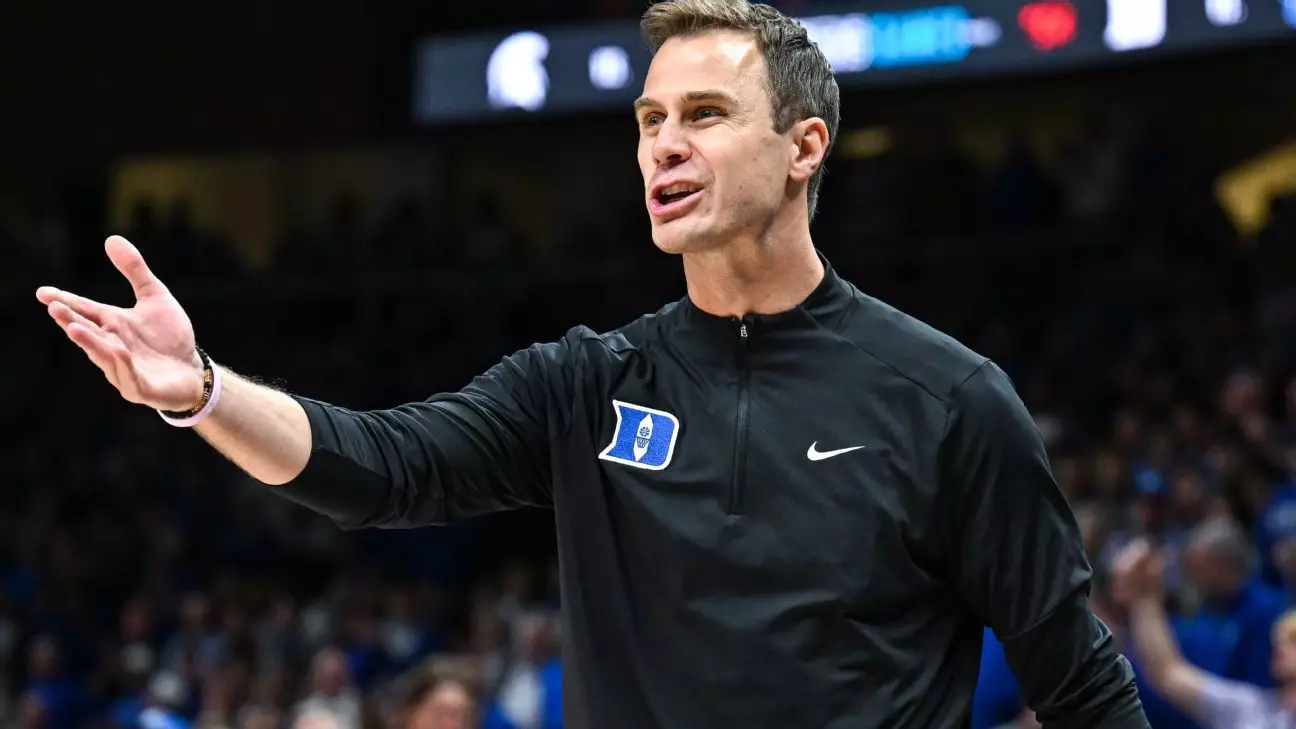The Duke Blue Devils are facing critical issues that could affect their performance as the season progresses. With head coach Jon Scheyer expressing unease over the recurring cramping problems experienced by his young players, the team finds itself at a notable crossroads. In their recent game against Kentucky, the Blue Devils lost 77-72, largely due to a lack of stamina demonstrated by some key players, particularly freshman center Khaman Maluach. His struggle with cramping not only hindered his contributions but also raised questions about the team’s conditioning and overall fitness strategy.
In sports, especially at the collegiate level, physical health is paramount. For Duke, the inability to field a complete roster during crucial moments of the season could prove detrimental. Maluach, who has been touted as a potential NBA lottery pick, managed to score 10 points and grab 7 rebounds before exiting the game due to cramping. His inability to stay on the court highlighted the need for Duke’s coaching staff to evaluate their training regimens and recovery strategies.
Equally concerning was the injury to reserve guard Sion James, who left the game after sustaining a shoulder injury. These incidents accentuated the precarious state of Duke’s lineup. Scheyer’s comments reflect a deeper worry: can young athletes handle the rigorous demands of high-level collegiate basketball? The health and availability of players like Maluach and James will certainly be a focal point in the coming weeks, impacting not only their individual growth but the team’s cohesiveness as well.
Scheyer’s candid acknowledgment of the situation reveals an urgent need for action. The coach emphasized the necessity of taking a closer look at how the team can prevent further cramping issues, stating that “we’ve got to help these guys.” His commitment to collaborating with the training staff speaks to the proactive measures that will need to be implemented.
It is vital to ensure that players are properly hydrated and nourished in preparation for high-pressure matches. In addition, conditioning programs must be tailored to the physical needs of the athletes, particularly freshmen who may not yet be accustomed to the rigors of competitive play. The focus must shift from merely attempting to cope with these problems to having a strategic approach that incorporates recovery techniques, dietary plans, and perhaps even more rigorous training methods to adapt to game demands.
The implications of fatigue extend beyond individual players; they impact team synergy and game strategy. Losing key contributors like Maluach and James at critical junctures can swing momentum in favor of the opposition, as was evidenced by the nail-biting loss to Kentucky. As the Blue Devils look to improve their standing, it will be essential to create an environment where all players can perform at their highest possible level without fear of physical limitations.
Even amidst concerns about other players, such as star freshman Cooper Flagg—who had experienced cramping in a prior game against Army—there were some silver linings. Flagg exhibited resilience by scoring 26 points and contributing substantial rebounds against Kentucky, proving that despite the challenges, Duke has the potential to excel. However, this cannot be a situation where only the standout players are relied upon. The entire roster must be managed effectively to ensure all players can endure the trials of a demanding season.
Duke’s coaching staff faces the daunting task of not only addressing current fitness issues but also preparing the team for an unpredictable season. They must harness this situation to build a culture of resilience, ensuring that every player has the support they need to thrive. Focused training, conscious hydration efforts, and a comprehensive wellness approach will be critical as the Blue Devils seek to solidify their standing.
As they move forward, the lessons learned from these early-season struggles could very well be the backbone of a successful season down the line. With a renewed emphasis on player health and rigorous preparation, Duke has the potential to turn the tide and emerge stronger, both individually and as a unified force. The journey is arduous, but it is one that will undoubtedly pay dividends in the long run if effectively navigated.

Leave a Reply